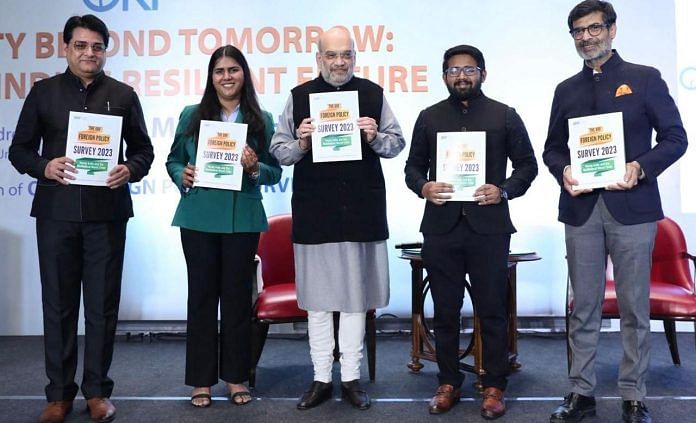New Delhi: As many as 58 percent of young Indians want greater economic engagement with China, a survey by the think tank Observer Research Foundation (ORF) has found.
The ORF’s Foreign Policy Survey 2023 also found that the majority of Indian urban youths believe the US, Australia and Japan (Quad partners) and Russia will emerge as India’s leading partners in the next 10 years.
The ORF survey was conducted between 7 August and 15 September 2023 among 5,000 respondents aged 18-35 across 19 cities. It was launched Monday in New Delhi by Union Minister of Home Affairs Amit Shah.
A large number of respondents said the US (81 percent), Russia (77 percent), Australia (77 percent) and Japan (76 percent) are very likely or somewhat likely to emerge as India’s leading partners in the next decade, highlighting their satisfaction with Delhi’s bilateral relationship with those countries.
However, the ORF report notes that positive responses towards the US have fallen by four percentage points in comparison to its 2022 findings — highlighting the “minute” rifts and “divergences” between the two countries perceived by the respondents.
The survey was conducted before the news of the US indicting an Indian in an alleged plot to kill Sikh radical Gurpatwant Singh Pannun — a designated terrorist in India — broke in November 2023.
Meanwhile, 34 percent of respondents said China is very likely or somewhat likely to become India’s leading partner in the next decade — a 10-percentage-point increase since 2022, highlighting a decreasing scepticism among the Indian urban youth towards Beijing.
Also Read: China has changed the equation for India’s neighbours. New Delhi can’t neglect them anymore
More economic engagement with China
Nearly half of the respondents, 49 percent, expressed dissatisfaction with the state of bilateral ties between New Delhi and Beijing.
The report found that the majority of respondents recognised the growing tensions between India and China, but expressed views favouring greater economic engagement between the two countries.
The 58 percent figure for those who expressed support for boosting economic ties between New Delhi and Beijing marks a 4-percentage-point increase over 2022.
Even so, as many as 86 percent recognised China’s ‘debt trap’ and ‘salami slicing’ policies in India’s neighbourhood as a serious concern for New Delhi.
Pakistan, for example, received $68.91 billion in loans from China between 2000 and 2021 — with $33 billion lent during 2015-2017.
Islamabad, facing a deep economic crisis, has consistently knocked on the doors of the International Monetary Fund (IMF) for bailouts, with the latest being in July 2023.
Eighty percent of the respondents also agreed that trust between India and China has been severely depleted following the 2020 Galwan clash.
India-Russia ties: Strategic autonomy with concerns
The survey findings suggest growing support for India’s position of strategic autonomy, especially in its bilateral relationships with Moscow and Washington.
A total of 51 percent said India should remain neutral as tensions between the West and Russia grow in light of the latter’s war on Ukraine, while 21 percent called for India to cooperate with Russia. Around 17 percent said India should cooperate with the West.
While the data shows that the age, gender, education, geography and occupation of the respondents have no measurable impact on this view, the majority of those earning Rs 1,20,000-1,50,000 (60 percent) and more than Rs 1,50,000 (70 per cent) emerged as firm believers in India’s neutrality regarding Russia and the West.
Moreover, 80 percent strongly agreed or somewhat agreed that India should remain neutral with regards to the Russia-Ukraine war.
But some concerns did emerge regarding the trajectory of the traditional partnership between Moscow and New Delhi.
Around 82 percent of the respondents said India should diversify its defence partnerships, and look beyond Russia for defence equipment. Meanwhile, 76 percent of urban youth saw the growing closeness between Moscow and Beijing as a cause of worry for New Delhi.
On FTAs
Three-fourths (75 percent) of the respondents agreed with the idea that free trade agreements (FTAs) would be beneficial for the Indian economy as they could increase job opportunities and raise their standard of living.
Around 30 percent said the Regional Comprehensive Economic Partnership (RCEP), an FTA involving 15 Asia-Pacific countries, “might” benefit India the most.
As the report notes, in the 2021 survey, the decision to withdraw from the RCEP emerged as the least popular in an assessment of the Modi government’s foreign policy decisions.
On 4 November, 2019 India announced its decision to not join the ASEAN-led RCEP. The RCEP at that point in time was being negotiated between the 10 members of the Association of Southeast Nations (ASEAN) — Brunei, Cambodia, Indonesia, Laos, Malaysia, Myanmar, the Philippines, Singapore, Thailand and Vietnam — and six partner countries, Australia, China, Japan, South Korea, New Zealand and India.
Domestically, the Indian government faced stiff opposition from its industries and the farming community over the agreement, mainly due to fears of Chinese agricultural and industrial products flooding into the country.
In the 2023 survey, the RCEP received more of a positive response than other regional frameworks assessed — the Indo-Pacific Economic Framework for Prosperity (IPEF), a 14-nation initiative also including the US, and the Comprehensive and Progressive Agreement for Trans-Pacific Partnership (CPTPP), a 12-nation FTA also including the UK.
As many as 18 percent of the respondents said the IPEF was beneficial for India, which is part of the framework, while 13 percent said the same regarding the CPTPP, which doesn’t include India.
(Edited by Sunanda Ranjan)
Also Read: China must stop seeing India as inferior. Its own scholar calls Delhi ‘stronger, assertive’



